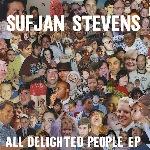
Sufjan Stevens All Delighted People EP
(Self-released)
I once dated a girl for nearly seven years. In that time, I came to know her dad pretty well. A fellow music nerd, his taste centered on long-form blues, 15-minute-plus epics of red-hot jammin' action. As a boy reared on three-minute punk implosions, we could never totally see eye-to-eye (plus, he hated Michael McDonald; who does that?) And while the girl and I are no longer together, I miss talking to him. If I could see him now, I'd say, "Biff, you were totally wrong; songs in and around the 10-minute range really are, generally speaking, no good." And he might chuckle like he was known to do, and I'd continue by saying I have proof while holding up my copy of Sufjan Stevens' All Delighted People EP. Then I'd ask him how his daughter's doing.
The EP is built on and supported by two versions of the title track: the original, clocking in at 11:38, and the classic rock version, which was thinned down to a lean eight minutes. Before I go on, though, I should note that I don't actually immediately hate all songs that lean toward the lengthy end of the spectrum; just look back at my Moulettes review. But my initial distrust and general misunderstanding are perfectly supported and summarized in these aforementioned tracks, along with a song that clocks in at just over 17-minutes.
My primary critique is a succinct cry that the title tracks are far too long for their own good. While my seemingly simple, borderline idiotic issue may upset the sophisticated audiophiles of the world, who will drink up the musical ups and downs, the ethereal highs and lows of mangled distortion quite easily, I submit that the original version is hurt by its length. The shifts in mood, the incremental pace toward developing a sonic story would prove to be much more fruitful in tiny sips. And while the classic rock version does work toward that end with a while three minutes shaved off, its near-identical outcome, save for a few instrumentation changes and a more energetic time signature, stifles it almost completely. But of the three tracks, Djohariah is the worst offender, the aforementioned gargantuan Hindu god of self-indulgent indie music. As a reviewer who prides himself on absorbing the whole effort, to the point I once listened to 30 Seconds To Mars twice in a row, much skipping around was done with this song. And I can’t be the only one with patience for such a behemoth, especially since when Stevns does get it right, he gets it oh-so right.
While I applaud Stevens for his conscious decision to play around with electronics and experiment with song length/structure, the redeeming qualities of the EP, Enchanting Ghost and Heirloom, add up to a mere six and a half minutes. Enchanting Ghost, as punny and clichéd as it may be, is a haunting acoustic piece of beautiful sorrow. With some of the most concise and heart-wrenching lyrics of the whole EP (like, "If it pleases you to leave me, just go/Stopping you would stifle your enchanting ghost"), and coupled with a wraith-like falsetto, it gently rips your guts from your torso. And while the big anthems are meant to explore the power of sounds, Stevens works best when he explores the power of words and the way his mutant voice can delve their depths. Heirloom is equally as strummy, not nearly as powerful, and what fans of experimentation should be gravitating toward. With a baseline folky vibe, the space Stevens has created feels like a big fish in a small pond, a struggle between keeping things intimate while fighting the urge to have things swell. Even as the song slowly fades, you're still not sure who won that battle.
In my limited experience, all relationships cease to be successful and are denied any lasting value because of one fatal flaw separating both parties. In the love affair of listeners to this EP, an overly ambitious singer-songwriter who seems to be far more into growing artistically then creating genuine songs will force fans and detractors alike into the arms of another.
